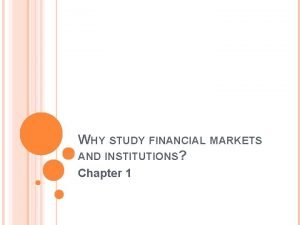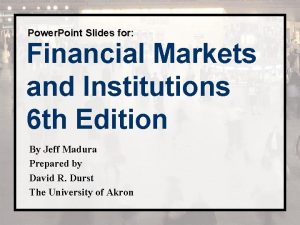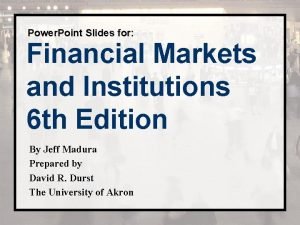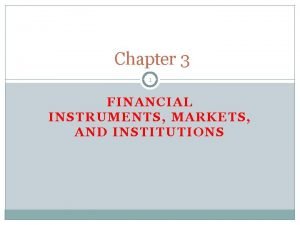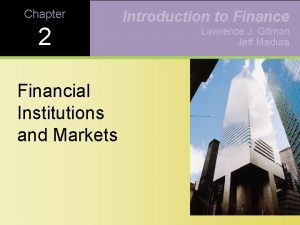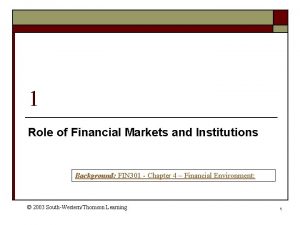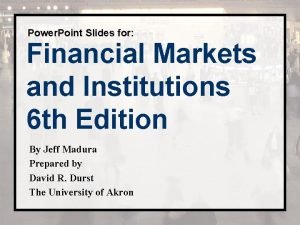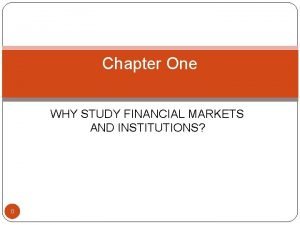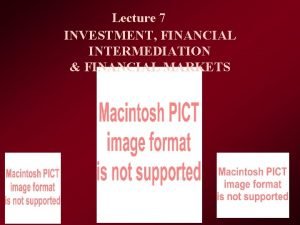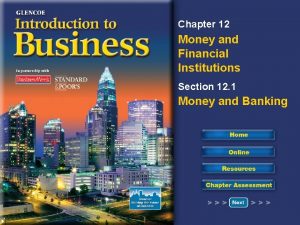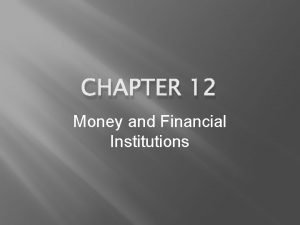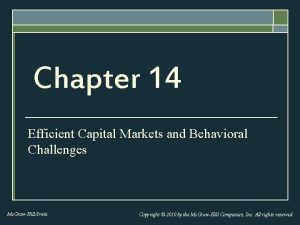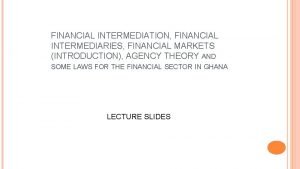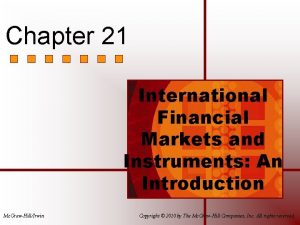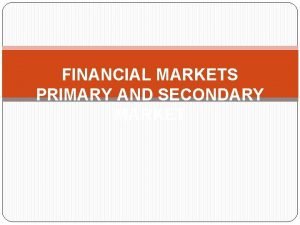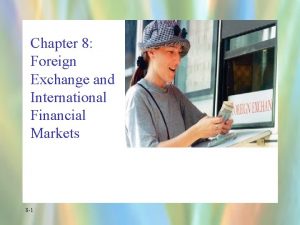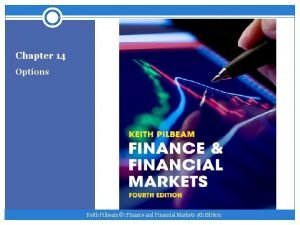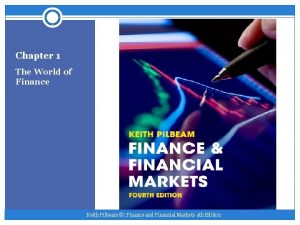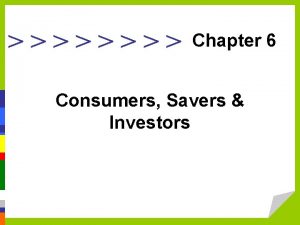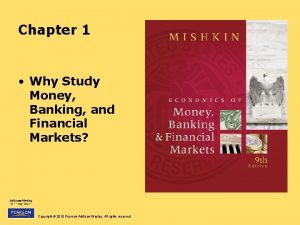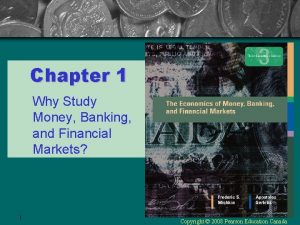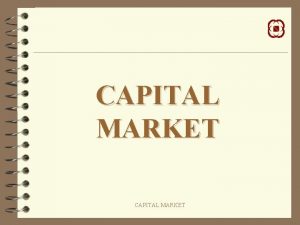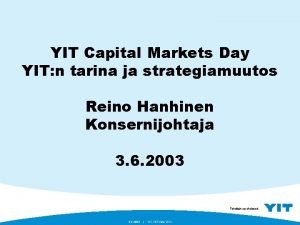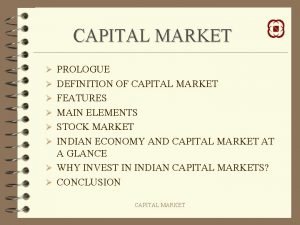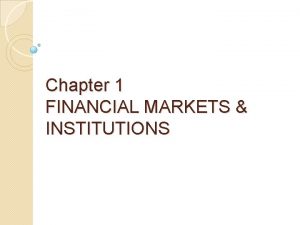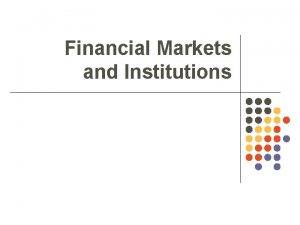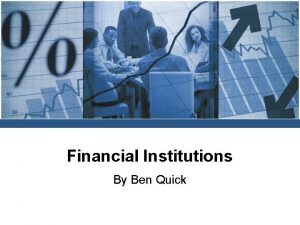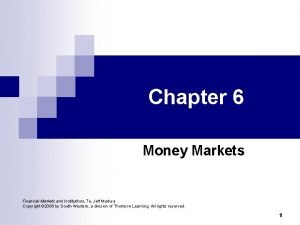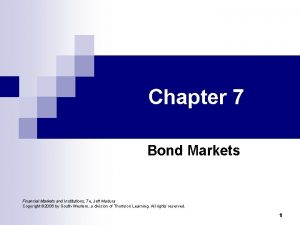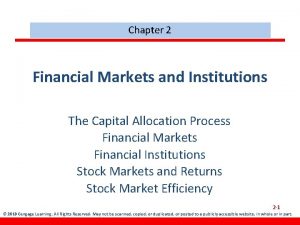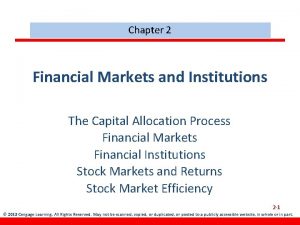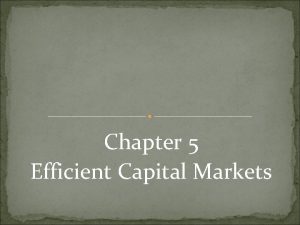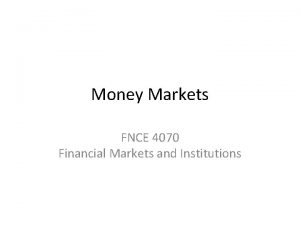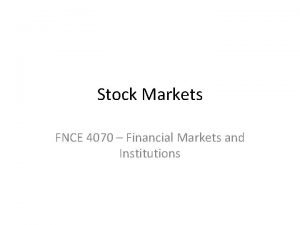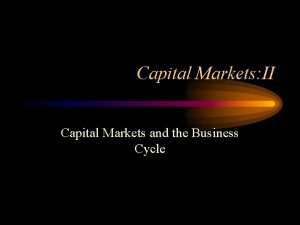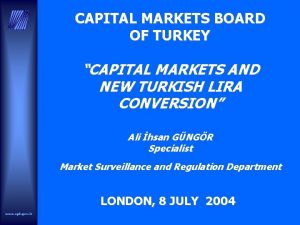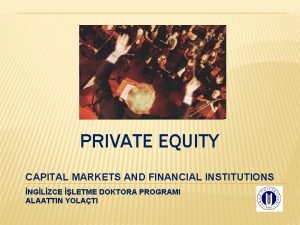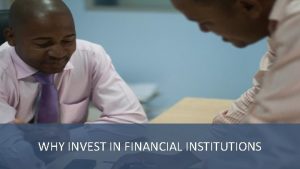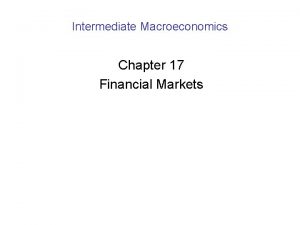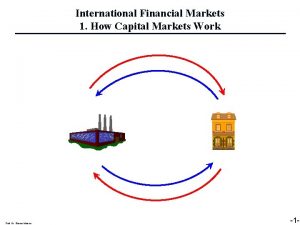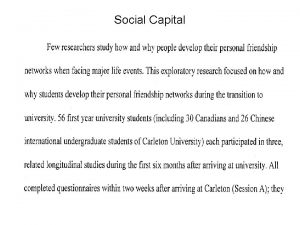Chapter 2 Financial Markets and Institutions THE CAPITAL
























- Slides: 24

Chapter 2 Financial Markets and Institutions § THE CAPITAL ALLOCATION PROCESS § FINANCIAL MARKETS § FINANCIAL INSTITUTIONS § STOCK MARKETS AND RETURNS § STOCK MARKET EFFICIENCY Dr. Mohammad Alkhamis Kuwait University - College of Business Administration 1

The Capital Allocation Process § Suppose. . § Aljazeera Airways wants to buy a Boeing 777 aircraft costing 100 million KD but it does not have enough cash to do so. . § Your want to buy a new home costing 200, 000 KD but you only have 100, 000 KD in your bank account. . § Where will the extra money come from? § On the other hand suppose that. . § KDD accumulated 50 million KD of cash that it wants to invest. . § Nasser’s salary is 1500 KD per month but he only spends 800 KD. . Dr. Mohammad Alkhamis Kuwait University - College of Business Administration 2

The Capital Allocation Process § In a well-functioning economy, capital flows efficiently from those who supply capital to those who demand it. § Suppliers of capital: individuals and institutions with “excess funds. ” These groups are saving money and looking for a rate of return on their investment. § Demanders or users of capital: individuals and institutions who need to raise funds to finance their investment opportunities. These groups are willing to pay a rate of return on the capital they borrow. Dr. Mohammad Alkhamis Kuwait University - College of Business Administration 3

How is capital transferred between savers and borrowers? Dr. Mohammad Alkhamis Kuwait University - College of Business Administration 4

What is a market? § A market is a venue where goods and services are exchanged. § A financial market is a place where individuals and organizations wanting to borrow funds are brought together with those having a surplus of funds. Dr. Mohammad Alkhamis Kuwait University - College of Business Administration 5

Types of Financial Markets § Physical assets vs. Financial assets § Spot vs. Futures § How does the KPC deal with its oil sales? § Money vs. Capital § Primary vs. Secondary § Public vs. Private Dr. Mohammad Alkhamis Kuwait University - College of Business Administration 6

The Importance of Financial Markets § Well-functioning financial markets facilitate the flow of capital from investors to the users of capital. § Markets provide savers with returns on their money saved/invested, which provide them money in the future. § Markets provide users of capital with the necessary funds to finance their investment projects. § Well-functioning markets promote economic growth. § Economies with well-developed markets perform better than economies with poorly-functioning markets. Dr. Mohammad Alkhamis Kuwait University - College of Business Administration 7

What are derivatives? How can they be used to reduce or increase risk? § A derivative security’s value is “derived” from the price of another security (e. g. , options and futures). § Can be used to “hedge” or reduce risk. For example, an airline company, whose profit falls when the price of fuel increases, could purchase fuel futures that do well when the price of fuel drops. § Also, speculators can use derivatives to bet on the direction of future stock prices, interest rates, exchange rates, and commodity prices. In many cases, these transactions produce high returns if you guess right, but large losses if you guess wrong. Here, derivatives can increase risk. Dr. Mohammad Alkhamis Kuwait University - College of Business Administration 8

Types of Financial Institutions § Commercial banks § Investment banks § Financial services corporations § Pension funds § Life insurance companies § Mutual funds § Hedge funds § Exchange traded funds § Private equity companies Dr. Mohammad Alkhamis Kuwait University - College of Business Administration 9

Dr. Mohammad Alkhamis Kuwait University - College of Business Administration 10

Stock Market Transactions § Apple Computer decides to issue additional stock with the assistance of its investment banker. An investor purchases some of the newly issued shares. Is this a primary market transaction or a secondary market transaction? § Since new shares of stock are being issued, this is a primary market transaction. § What if instead an investor buys existing shares of Apple stock in the open market. Is this a primary or secondary market transaction? § Since no new shares are created, this is a secondary market transaction. Dr. Mohammad Alkhamis Kuwait University - College of Business Administration 12

What is an IPO? § An initial public offering (IPO) is where a company issues stock in the public market for the first time. § “Going public” enables a company’s owners to raise capital from a wide variety of outside investors. Once issued, the stock trades in the secondary market. § Public companies are subject to additional regulations and reporting requirements. Dr. Mohammad Alkhamis Kuwait University - College of Business Administration 13

S&P 500 Index, Total Returns for the past 30 years Dr. Mohammad Alkhamis Kuwait University - College of Business Administration 14

KSE Price Index, Total Returns: 1996 -2012 120. 00% 100. 00% 80. 00% 60. 00% 40. 00% 20. 00% -20. 00% -40. 00% -60. 00% 1996 Dr. Mohammad Alkhamis 1998 2000 2002 2004 2006 2008 2010 Kuwait University - College of Business Administration 2012 15

Where can you find a stock quote, and what does one look like? § Stock quotes can be found in a variety of print sources (newspapers) and online sources (KSE’s website). § http: //finance. yahoo. com/ § http: //www. boursakuwait. com/A/Market/RQuotes. aspx Dr. Mohammad Alkhamis Kuwait University - College of Business Administration 16

What is meant by stock market efficiency? § Securities are normally in equilibrium and are “fairly priced. ” § Investors cannot “beat the market” except through good luck or better information. Efficiency continuum: Highly Inefficient Highly Efficient Small companies not followed by many analysts. Not much contact with investors. Large companies followed by many analysts. Good communications with investors. Dr. Mohammad Alkhamis Kuwait University - College of Business Administration 17

Implications of Market Efficiency § You hear in the news that a medical research company received FDA approval for one of its products. If the market is highly efficient, can you expect to take advantage of this information by purchasing the stock? § No. If the market is efficient, this information will already have been incorporated into the company’s stock price. So, it’s probably too late for her to “capitalize” on the information. Dr. Mohammad Alkhamis Kuwait University - College of Business Administration 18

Implications of Market Efficiency § A small investor has been reading about a “hot” IPO that is scheduled to go public later this week. She wants to buy as many shares as she can get her hands on, and is planning on buying a lot of shares the first day once the stock begins trading. Would you advise her to do this? § Probably not. The long-run track record of hot IPOs is not that great, unless you are able to get in on the ground floor and receive an allocation of shares before the stock begins trading. It is usually hard for small investors to receive shares of hot IPOs before the stock begins trading. Dr. Mohammad Alkhamis Kuwait University - College of Business Administration 19

The Efficient Markets Hypothesis § The Efficient Markets Hypothesis (EMH) is made up of three progressively stronger forms: All historical prices and returns § Weak Form § Semi-strong Form § Strong Form All information, public and private Dr. Mohammad Alkhamis All public information Kuwait University - College of Business Administration 20 © P. Kulkarni& K. Pawar

The Weak Form § The weak form of the EMH says that past prices, volume, and other market statistics provide no information that can be used to predict future prices. § If stock price changes are random, then past prices cannot be used to forecast future prices. § Price changes should be random because it is information that drives these changes, and information arrives randomly. § This form of the EMH, if correct, contradicts technical analysis. § Most research supports the notion that the markets are weak form efficient. Dr. Mohammad Alkhamis Kuwait University - College of Business Administration 21 © P. Kulkarni& K. Pawar

The Semi-strong Form § The semi-strong form says that prices fully reflect all publicly available information and expectations about the future. § This suggests that prices adjust very rapidly to new information, and that old information cannot be used to earn superior returns. § Most studies find that the markets are reasonably efficient in this sense, but the evidence is somewhat mixed. Dr. Mohammad Alkhamis Kuwait University - College of Business Administration 22 © P. Kulkarni& K. Pawar

The Strong Form § The strong form says that prices fully reflect all information, whether publicly available or not. § Even the knowledge of material, non-public information cannot be used to earn superior results. § Most studies have found that the markets are not efficient in this sense. Dr. Mohammad Alkhamis Kuwait University - College of Business Administration 23 © P. Kulkarni& K. Pawar

Do you think it is better to have efficient or inefficient markets? Dr. Mohammad Alkhamis Kuwait University - College of Business Administration 24

Do you think the market for all stocks are equally efficient? Dr. Mohammad Alkhamis Kuwait University - College of Business Administration 25
 Why study financial markets and institutions chapter 1
Why study financial markets and institutions chapter 1 Participants in money market
Participants in money market Financial markets and institutions ppt
Financial markets and institutions ppt Financial markets instruments and institutions
Financial markets instruments and institutions Madura j. financial markets and institutions
Madura j. financial markets and institutions Functions of financial markets and institutions
Functions of financial markets and institutions Madura j financial markets and institutions
Madura j financial markets and institutions Why study financial markets and institutions
Why study financial markets and institutions Savers and investors role in financial markets
Savers and investors role in financial markets Financial markets and the allocation of capital
Financial markets and the allocation of capital Chapter 12 money and financial institutions
Chapter 12 money and financial institutions Chapter 12 money and financial institutions
Chapter 12 money and financial institutions Efficient capital markets and behavioral challenges
Efficient capital markets and behavioral challenges Financial intermediaries and markets
Financial intermediaries and markets International financial markets and instruments
International financial markets and instruments Difference between primary and secondary market
Difference between primary and secondary market Types of exchange rate
Types of exchange rate Pilbeam k. finance and financial markets
Pilbeam k. finance and financial markets Pilbeam finance and financial markets
Pilbeam finance and financial markets Chapter 6 consumers savers and investors answer key
Chapter 6 consumers savers and investors answer key Why study money banking and financial markets
Why study money banking and financial markets Why study money banking and financial markets
Why study money banking and financial markets Capital market instruments in india
Capital market instruments in india Metsä board osinko
Metsä board osinko Equity capital markets definition
Equity capital markets definition
